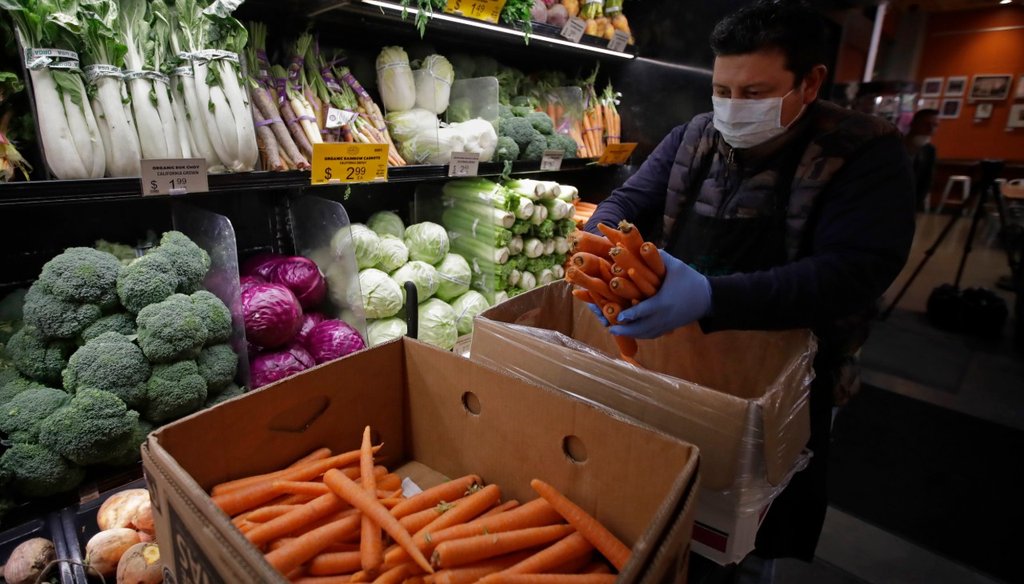

Our only agenda is to publish the truth so you can be an informed participant in democracy.
We need your help.


In this March 27, 2020, file photo, a worker, wearing a protective mask against the coronavirus, stocks produce before the opening of Gus's Community Market in San Francisco. (AP Photo/Ben Margot, File)
In the earliest days of the coronavirus outbreak, when public officials scrambled to close schools and businesses, a Facebook user lamented the inequity of the quarantine that Gov. Tom Wolf had imposed on Pennsylvanians.
"The poor are, ironically, the most likely to be employed in the industries deemed ‘essential’ while their upper-class peers are freed to bunker down for weeks until the first death wave passes," the Facebook user wrote on March 18.
We wondered whether this claim would hold up when we looked at the data.
Starting with Wolf’s executive order forcing all non-life-sustaining businesses to close, we pulled U.S. Bureau of Labor Statistics information on the number of Pennsylvania workers in each essential industry and calculated their average annual wages.
The Facebook user is right. The vast majority of life-sustaining workers earn low and working-class wages.
A quarter of Pennsylvania’s essential workers make less than $30,000 annually, and two-thirds make less than the state’s household median of $60,000, raising questions about whether the people keeping the rest of society afloat are being sufficiently protected and compensated.
Grocery stores employ one of the largest groups of workers making the lowest wages. There are more than 120,000 grocery store workers in Pennsylvania, the data shows, and average annual wages for the sector are about $23,000. Gas stations, assisted living centers and building maintenance firms are among the other essential businesses employing large numbers of low-wage workers across the state.
Philadelphia-area grocers including Giant, Acme and Aldi recently started limiting the number of shoppers allowed in their stores at once to protect workers.
Still, across the country, dozens of grocery clerks have already been sickened with the virus. And a Trader Joe’s worker in Scarsdale, N.Y., a greeter at a Giant store in Largo, Md., and two Walmart employees from the same Chicago-area store have died from the coronavirus in recent days.
Acknowledging how vulnerable essential workers are, Wolf recently announced new rules aimed at preventing the virus from spreading in businesses open to in-person customers. Grocery stores must now make all workers and customers wear masks and start taking employees’ temperatures if a worker tests positive.
But even as the state rolled out these new protections, it hasn’t done any more to ensure that the workers Wolf deemed essential are fairly compensated besides asking employers to step up and do the right thing. Wolf called fair pay for essential workers "the responsibility of the private sector."
Among the grocers that operate in the Philadelphia area, several chains, including Trader Joe’s, Whole Foods, Wegmans, Fresh Grocer, Giant Eagle and Acme have started offering workers bonuses or higher hourly wages to their workers because of the coronavirus outbreak.
The second part of the Facebook post addresses the perk the user believes white collar workers have enjoyed since Wolf ordered millions of Pennsylvanians to stay at home – the freedom to work from home.
Federal data from a Bureau of Labor Statistics survey on the share of workers who say they’re able to telecommute shows a stark divide among industries, The Washington Post reported
About 60 percent of people who said they work in "management, business and financial operations" said they can work from home. But fewer than 10 percent of workers said they could do so in categories such as "services," "construction and extraction," "installation, maintenance and repair," "production" and "transportation and material moving."
The Post also found divisions along race and class lines.
Thirty-seven percent of Asian Americans and 30 percent of whites said they could work remotely. But only 20 percent of African Americans and 16 percent of Hispanics said they had that ability. Almost 52 percent of those with a college education or higher said they could work from home, but only 4 percent of those with less than a high school diploma said they could.
The Facebook post stated that the poor are the most likely to be employed in essential industries while workers who earn more are free to shelter at home until the outbreak subsides.
Our data analysis shows that the vast majority of workers Wolf deemed essential earn low and working class wages, and a recent analysis by The Washington Post shows that many white collar workers say they’re able to telecommute. For these reasons, we rate the Facebook post True.
An earlier version of this article excluded several Philadelphia-area grocers that have offered employees bonuses or higher salaries.The story has been updated.
Wolf Administration, "All non life-sustaining businesses in Pennsylvania to close physical locations as of 8 pm today to slow spread of COVID-19," March 19, 2020
The Philadelphia Inquirer, analysis of U.S. Bureau of Labor Statistics data on Pennsylvania workers, April 9, 2020
The Philadelphia Inquirer, "Giant, Acme, Aldi, among Philly-area grocery stores limiting customer capacity due to the coronavirus," April 13, 2020
The Philadelphia Inquirer, "Grocery workers in U.S. are beginning to die of coronavirus," April 6, 2020
The Philadelphia Inquirer, "All Pa. businesses must require employees and customers to wear masks amid coronavirus pandemic," April 16, 2020
CNN, "Bonuses and pay hikes: How grocery stores keep workers on the front lines," March 23, 2020
The Washington Post, "Working from home reveals another fault line in America’s racial and educational divide," March 22, 2020
In a world of wild talk and fake news, help us stand up for the facts.
